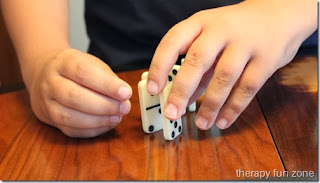Praxis is when you think "I want to put my socks on", but then your brain tells your muscles what steps they need to take in order to accomplish the task.
When suffering from apraxia, you have trouble figuring out what you need your muscles to do in order to accomplish this task. The term can be used related to tasks, so you may hear someone talk about different kinds: speech apraxia, dressing apraxia, oral apraxia.
Thanks to the creators of this totally cool website Therapy Fun Zone, many different motor planning activities are shared with us and I am going to share two of them with you.
1. Balloon Volleyball is such a simple game to play that is fun for young and old. It can be played standing up or sitting down, although when sitting down, someone will need to retrieve the balloon when it is out reach. I don’t think I need to say this, but will, just in case. The balloon needs to be blown up by lung power, no helium, or the balloon will fly away.
- The objective of the game is to keep the balloon in the air for as long as possible. You have to reach up to hit the balloon, but it is easier than using a regular ball since it is so light and floats down. You can substitute a beach ball, which is a bit heavier so it will be a little harder because it won’t stay in the air as long.
- Reaching up to hit the balloon works on arm strength and upper extremity range of motion as well as working on the movements for trunk and shoulder stability. When playing the game while standing, you can work on standing balance and weight shifting as well as lower extremity strength.
Skills:
- Upper extremity strength
- Lower extremity strength if standing
- Balance
- Trunk control
- Shoulder stability
- Core strength
- Motor planning
2. Dominos: When playing dominos in therapy, we don’t usually play the game of dominos . Instead we line them up to knock them over. Lining the dominos up on end requires fine motor precision in getting them to stay in place. It also takes eye hand coordination and visual perceptual skills to get the dominos lined up properly. Then the fun part is knocking them over and seeing them fall down in a row. You can make it simple or detailed by how you line them up.
Skills:
- Fine motor
- Visual perceptual
- Crossing midline
- Upper extremity strength
- Fine motor precision
- Reach and grasp


I loved playing balloon volleyball, aka "Don't let it touch the ground" as a child. I never thought that something as fun and simple as that could be used as a therapeutic technique.
ReplyDeleteAlso, I'd love to know what actually causes apraxia. Is it hereditary or does something have to happen in order to obtain it?
It's very interesting that just the simplest things can help to refine motor skills and combat such a terrible condition. I can't imagine the confusion or frustration that would comes with apraxia.
ReplyDeleteThis is creative and does not seem like the typical therapy that someone would imagine. I used to play volleyball with balloons too and it was my favorite thing to do after parties were done in school. These are innovative and simple techniques that will help those who are suffering from Apraxia.
ReplyDeleteTo begin, I love how you explained what apraxia is and that there can be different kinds of apraxia. Secondly, many people do not realize how simple activities like setting up dominoes can be a therapy for helping to build fine motor skills. As someone who works with preschool children I definitely understand the importance of building both fine motor and gross motor skills!
ReplyDelete